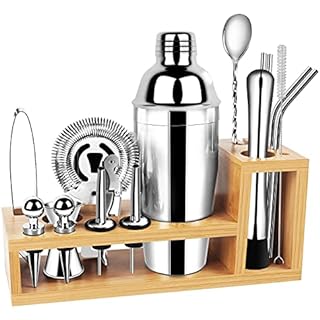Discover how to care for bar tools to elevate your cocktail game and keep them in top condition for the perfect drink.
Welcome to Shake, Sip, Serve, your one-stop shop for all things bartending.
I’m your host, KAD, and I’ve been slinging drinks and navigating the world of hospitality for over two decades.
The past 15 years, I’ve perfected my bartending skills, experimented with countless flavor combinations, and learning a thing or two about how to keep the party going behind the bar.
Whether you’re a seasoned bartender like me just looking for some fresh inspiration or a complete beginner who is eager to whip up impressive cocktails at home, Shake, Sip, Serve is here to be your guide.
In the below blog, I’ll be sharing my knowledge and experience on everything from classic cocktails and innovative new creations to essential bartending techniques and industry secrets. I’ll also be offering tips on stocking your home bar, mastering the art of presentation, and creating a memorable experience for your guests.
So, grab your shaker, dust off your favorite glassware, and get ready to embark on a delicious journey into the world of bartending!
Let’s Shake, Sip, and Serve up something amazing together.
Disclaimer: This post contains affiliate links. If you purchase through these links, I may earn a small commission at no additional cost to you.
The clinking of ice, the rhythmic shake, the precise pour – these are the hallmarks of a well-crafted cocktail. But behind every delicious drink lies a set of tools, meticulously cared for and ready to perform. Your bar tools are an extension of your skill, and their condition directly impacts the quality, safety, and longevity of your mixology. This comprehensive guide delves into the art and science of bar tool maintenance, providing expert insights and practical tips for both home enthusiasts and professional bartenders.
The Importance of Bar Tool Care:
The meticulous care of bar tools is paramount, extending far beyond mere aesthetic considerations. It is a critical element in ensuring the hygiene, functionality, and longevity of these essential implements of mixology. Proper maintenance plays a vital role in preventing the proliferation of bacteria, yeasts, and molds, which can compromise the flavor profile and, more importantly, the safety of the beverages you create. Residue from previous cocktails, if left unaddressed, can harbor microorganisms that not only impart undesirable flavors but also pose potential health risks. Regular cleaning and sanitation are therefore non-negotiable for maintaining a safe and sanitary bar environment.
Beyond hygiene, proper bar tool care is essential for optimal functionality. Tools that are free from residue and corrosion operate smoothly and efficiently. Jiggers, for instance, require meticulous cleaning to maintain their accuracy; sticky syrups or dried liquids can impede precise measurements, leading to inconsistent cocktails. Similarly, strainers clogged with fruit pulp or ice shards will not effectively separate solids from liquids, affecting the texture and clarity of your drinks. A well-maintained muddler, free from ingrained herbs and spices, will effectively express the essential oils from ingredients without imparting unwanted flavors from previous uses. In essence, proper care ensures that each tool performs its intended function with precision and consistency, contributing to a seamless and professional cocktail-making process.
Furthermore, consistent maintenance is an investment in the longevity of your bar tools. Regular cleaning and proper storage prevent corrosion, tarnish, and wear, extending the lifespan of these valuable assets. Neglecting bar tool care can lead to premature deterioration, requiring costly replacements. Corrosion, particularly on metal tools, can weaken the structure and compromise functionality. Tarnish, while primarily an aesthetic issue, can also be a sign of underlying corrosion. Wooden handles, if not properly treated and dried, can crack or warp. By implementing a consistent maintenance routine, you protect your investment and ensure that your bar tools remain a reliable and integral part of your mixology setup for years to come. Ultimately, the time and effort dedicated to bar tool care translate to higher-quality cocktails, a safer bar environment, and the long-term preservation of your valuable tools.
Essential Bar Tools and Their Specific Needs:
A well-equipped bar boasts a variety of tools, each playing a specific role in the creation of cocktails. Understanding the function of each tool and its material composition is crucial for proper care.
-
Shakers: Cocktail shakers, available in Boston and Cobbler styles, endure frequent use and come into contact with a diverse array of ingredients, from sugary syrups and acidic juices to aromatic bitters and potent spirits. This constant exposure necessitates thorough and consistent cleaning to prevent the buildup of residue, which can not only taint the flavor profile of subsequent drinks but also harbor bacteria. Cross-contamination of flavors is a significant concern, particularly when mixing cocktails with distinct and contrasting ingredients. Thorough cleaning between each use is essential to maintain the integrity of each individual cocktail’s intended taste. Disassembling shakers after each use and washing all components with warm soapy water is recommended.
Jiggers: Jiggers, the indispensable tools for precise cocktail measurements, are crucial for achieving consistent and balanced flavor profiles. Accuracy in measuring liquids is paramount, and any sticky syrups, leftover juices, or other residue can significantly impact a jigger’s accuracy over time. Even small amounts of residue can alter the intended proportions of a cocktail, affecting its taste and balance. Regular cleaning with warm soapy water, ensuring all residue is removed from the interior and exterior surfaces, is vital for maintaining the jigger’s calibration and ensuring precise pours. Drying the jigger thoroughly after cleaning is also important to prevent water spots and potential corrosion.
Strainers: Cocktail strainers, particularly fine strainers, play a critical role in separating solids from liquids, ensuring a smooth and palatable drink. These tools are especially prone to clogging with fruit pulp, ice shards, and small pieces of herbs or spices. A clogged strainer compromises its functionality, hindering the smooth flow of liquids and potentially altering the texture and clarity of the cocktail. Proper cleaning, involving rinsing under warm water immediately after use and occasionally using a small brush to dislodge any trapped particles, is essential to maintain the strainer’s effectiveness. Neglecting to clean strainers can also lead to the accumulation of residue, which can affect the taste of future drinks.
Muddlers: Muddlers, used to extract essential oils and flavors from fruits, herbs, and spices, require thorough cleaning to prevent the lingering taste of previous ingredients from affecting subsequent cocktails. Plant matter, if left on the muddler, can decompose and impart unwanted flavors to future drinks. Thorough cleaning involves washing the muddler with warm soapy water, paying particular attention to the textured end that comes into contact with ingredients. Using a small brush or toothpick to remove any trapped particles is also recommended. Wooden muddlers may require occasional treatment with food-safe mineral oil to prevent cracking or warping.
Bar Spoons: Bar spoons, used for stirring cocktails and layering ingredients, must be kept scrupulously clean to prevent flavor contamination. Even small amounts of residue from previous drinks can affect the delicate balance of flavors in subsequent cocktails. Regular cleaning with warm soapy water is essential, ensuring that all surfaces of the spoon, including the bowl and handle, are free from residue. Bar spoons are often used for layering drinks, and any lingering flavors could compromise the visual appeal and intended taste of layered cocktails.
Knives and Peelers: Bar knives and peelers, essential for preparing garnishes and ingredients, require regular sharpening to maintain their efficiency and, more importantly, prevent accidents. Dull knives are more likely to slip or cause injury. Regular sharpening using a sharpening steel or whetstone ensures clean cuts and precise preparation. Maintaining a sharp edge also reduces the force required to cut or peel, minimizing strain on the hand and wrist. Cleaning these tools thoroughly after each use is also crucial to prevent the transfer of flavors between ingredients.
Corkscrews and Bottle Openers: Corkscrews and bottle openers, while seemingly simple tools, require regular inspection for any signs of damage or wear that could affect their functionality. A damaged corkscrew can break a cork, making it difficult to extract and potentially contaminating the wine with cork fragments. A worn bottle opener may slip or fail to open a bottle effectively. Regular inspection for loose screws, bent metal, or other signs of wear is essential to ensure these tools function reliably and safely. Cleaning these tools after each use, particularly corkscrews which can accumulate cork residue, is also good practice.
Cleaning Techniques for Pristine Tools:
Cleanliness is paramount in mixology. Implementing a consistent cleaning routine is essential for maintaining the hygiene and functionality of your bar tools.
Daily Cleaning:
- Rinse Immediately: After each use, rinse your tools thoroughly with warm water. This prevents residue from drying and hardening, making cleaning easier.
- Mild Detergent: Use a mild, non-abrasive detergent specifically designed for barware or dishware. Avoid harsh chemicals or abrasive cleaners that can damage the surface of your tools.
- Gentle Scrubbing: Use a soft sponge, cloth, or brush to scrub your tools. Pay attention to crevices and hard-to-reach areas.
- Thorough Rinsing: Rinse your tools thoroughly with warm water to remove all traces of soap. Soap residue can affect the taste of your drinks.
- Immediate Drying: Dry your tools immediately with a clean, lint-free towel. This prevents water spots and helps to prevent rust or tarnish.
Deep Cleaning:
Periodic deep cleaning is necessary to remove stubborn stains, tarnish, or buildup.
- Stainless Steel: Soak stainless steel tools in warm, soapy water for 15-20 minutes. Use a soft-bristled brush to scrub away any remaining residue. For stubborn stains, a paste of baking soda and water can be effective. Rinse thoroughly and dry completely.
- Copper: Copper tools require special care to prevent tarnish. A mixture of lemon juice and salt can be used to gently scrub away tarnish. Rinse thoroughly and dry immediately. Copper polish can be used to restore shine.
- Glass: Wash glass tools with warm, soapy water and a soft sponge. Avoid abrasive cleaners or scouring pads. Rinse thoroughly and allow to air dry or dry with a lint-free cloth.
- Wood: Wooden handles or muddlers should be cleaned with warm, soapy water and a soft cloth. Avoid soaking wood, as this can cause it to crack or warp. Regularly treat wooden handles with food-safe mineral oil to prevent drying out.
Specialized Cleaners and Natural Alternatives:
While specialized barware cleaners are available, several natural alternatives can be equally effective:
- Vinegar: A solution of equal parts vinegar and water can be used to remove stains and odors from stainless steel and glass.
- Baking Soda: A paste of baking soda and water can be used to scrub away stubborn stains.
- Lemon Juice and Salt: This combination is effective for removing tarnish from copper.
Smart Storage Solutions:
Proper storage is crucial for protecting your bar tools and maximizing their lifespan.
- Wall-Mounted Racks: Wall-mounted racks keep tools organized and easily accessible, saving counter space.
- Magnetic Strips: Magnetic strips are ideal for storing metal tools, keeping them within reach and preventing them from rolling around in drawers.
- Drawer Organizers: Drawer organizers keep tools neatly arranged and prevent them from clanging together, which can cause damage.
- Bar Carts: Bar carts provide a dedicated space for storing and organizing your bar tools, making them easily accessible when entertaining.
Maintaining the Right Environment:
Store your bar tools in a cool, dry place away from direct sunlight and extreme temperatures. Avoid storing tools in humid environments, as this can promote rust and tarnish.
Regular Upkeep:
- Routine Inspections: Regularly inspect your tools for any signs of wear and tear, such as rust, cracks, or loose parts.
- Sharpening: Keep knives and peelers sharp to ensure efficient and safe use. Use a sharpening stone or consult a professional sharpening service.
- Lubrication: Periodically lubricate moving parts, such as corkscrews, with food-safe mineral oil.
When to Replace Tools:
Even with proper care, bar tools will eventually need to be replaced. Replace tools that are damaged, excessively worn, or no longer function properly.
Creating a Culture of Maintenance in a Professional Environment:
In a professional bar setting, it’s crucial to establish a culture of maintenance. Train staff on proper cleaning and storage procedures and implement regular checks to ensure that tools are being cared for properly.
Ergonomic Considerations:
Using bar tools ergonomically can prevent strain and injuries. Choose tools with comfortable handles and use proper techniques to avoid repetitive motions that can lead to discomfort.
Thanks for joining us behind the bar!
The bartending community is a vibrant and supportive one, and I’m excited to build that community here on Shake, Sip, Serve. I’d love to hear your thoughts, questions, and experiences in the comments below. What are you shaking up these days? What topics would you like to see covered in future posts? Let’s connect and continue the conversation!

Check out more :
Essential Bar Tools Every Mixologist Needs
How to Use a Jigger for Precision
How to Use A Muddler In Cocktails
Guide to the Best Cocktail Strainers
How To Properly Store And Care For Bar Tools
Bar Spoons And Stirrers
Choose Perfect Glassware for Elevating Cocktails
Finding Your Perfect Cocktail Shaker
Disclaimer: This post contains affiliate links. If you purchase through these links, I may earn a small commission at no additional cost to you.
